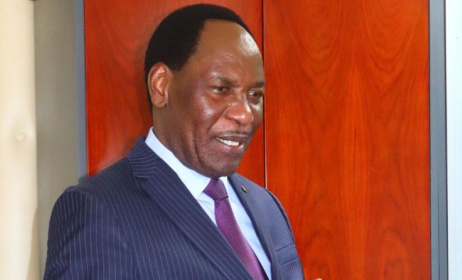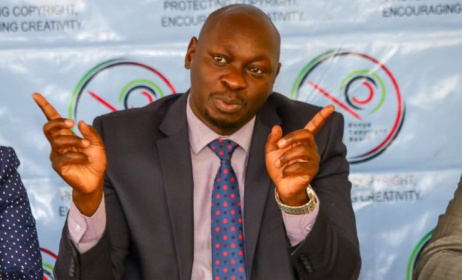MC Yallah: The East African rap queen playing by her rules
MC Yallah is a force of nature. It’s late at night when the boiling mid-February Nairobi heat has given way to a mildly refreshing draught blending in with music and intoxication and all-around camaraderie that can only be had at an intimate concert venue.
The spot is humming with drunken conversation as a soundcheck signals yet another act in an evening of impressive performances. An annoying mic feed splits the air, interrupting transactions at the cocktail bar and stopping those heading to the washrooms mid-stride. Shortly thereafter, chaos erupts.
Balanced delicately in high heels, a female artist attired in the most beguiling evening wear is kicking up a storm onstage. With one hand clasping the microphone and the other guiding the connecting cable around the stage effortlessly, she could easily be floating. She is beckoning the audience to join her set. She needn’t.
Backed by a band churning out sonorous growls, jangled riffs, mini explosions and all manner of distortions, we are ushered into the realm of unconventional hip hop, where death metal meets singeli and avant-garde electro complements Ugandan traditional drumming – all pieced together by rapid fire lyrics from MC Yallah.
Unapologetically feminine and street in delivery, she has unleashed a maelstrom that will suck us in for an hour or so. A nimble rap assassin, she can deconstruct the most complex issues in verse, switching effortlessly between Luganda, Swahili, English, Dholuo, Sheng (Kenyan slang) and Lugaflow (Ugandan slang).
Welcome to the ‘MC Yallah Show’ – a frenetic, absorbing affair that will not only leave you gasping for air and drenched in perspiration, but do a number on your social conscience.
The first thing I want to ask MC Yallah a few months after that show is, who are you and where have you been? But as it turns out, that question should’ve been redirected to me. You see, MC Yallah has been in the game since the late 1990s. A Kenyan by birth and a Ugandan by upbringing, Yallah Gaudencia Mbidde is the quintessential East African. At home in Kampala, Nairobi or Dar es Salaam, she can easily straddle the cultural identities defining the three cities better than most artists, enabling her to craft timely homilies.
A pioneer in her own right, she started her career when hip hop was at its infancy in the region in the mid-’90s. This was the period when the American sound was starting to penetrate the African airwaves and its attendant culture was being replicated in urban areas.
“My interest in music was sparked after listening to American hip hop artists like Tupac, Biggie, Busta Rhymes and Jamaican dancehall stars such as Chaka Demus & Pliers, Shabba Ranks, Patra and many more,” MC Yallah says. “Closer to home it was a Ugandan hip hop group named Young Vibez that pushed me into the game. In 1998, I decided this is it. This is what I want. This is what I am going to be.”
What, I ask, was it like starting out not only as a female artist but as a purveyor of a genre that was still a foreign concept to many at the time?
“It was both challenging and interesting at the same time. There were few venues and even fewer studios. We had absolutely no recording fees. All we thrived on was the support we received from the small audience we played to.”
After a few years in the game, MC Yallah took a break in 2003 for family reasons as she was expecting her first child. It was this break that offered her real perspective. “I missed music so much, and it’s at this point that I truly knew it was a calling. In 2008, I made a comeback.”
But the comeback was not as easy as she had anticipated. The landscape had changed and she was more or less a forgotten entity, unable to get airplay on radio or even in the clubs.
That was until 2013 when she met Derek Debru and Arlen Dilsizian – the two mavericks behind Ugandan underground labels Nyege Nyege Tapes and Hakuna Kulala and the world-famous Nyege Nyege Festival. It’s through the duo that she encountered Berlin-based producer Debmaster. It was a match made in beat heaven.
“I had reached a point where I had done it all and it was not working out for me until I received beats sent by Debmaster. I listened, and I was like, this is it. It was so complicated, and I felt I needed something to challenge me at the time.”
Nearly six years after communicating online, the two met and performed together onstage for the first time in Venice in 2019. Not long thereafter, the union gave birth to MC Yallah’s acclaimed 2019 debut album Kubali. The two have continued to work together since, playing gigs in Spain, Argentina, Chile, Brazil, the UK, Netherlands, Italy and Australia
Why so many European tours?
“There is a bigger appreciation of my music outside East Africa,” MC Yallah says. “My work has been well received in Europe and the rest of the world. Look, I have been in Australia for three years in a row now. The love in Australia is amazing. There is nothing different about the music I play – only the exposure. I hope East Africans will soon embrace the different genres of music out there and not just what the media is feeding them.”
You can enter the electro-hip hop universe of MC Yallah by listening to her latest offering ‘Nzimba Zinyota’(link is external), another scorching collab with Debmaster prepared for the 14th episode of the Kuboraum Digital Sound Residency. For more sonic adventures, you can also immerse yourself in her recent projects, Kubali(link is external) (2019) and Yallah Beibe(link is external) (2023), all bearing the expert signature marks of Debmaster, Japanese producer Scotch Rolex and Congolese electro producer ChrisMan.




































Comments
Log in or register to post comments